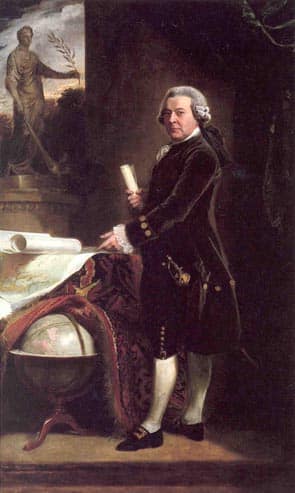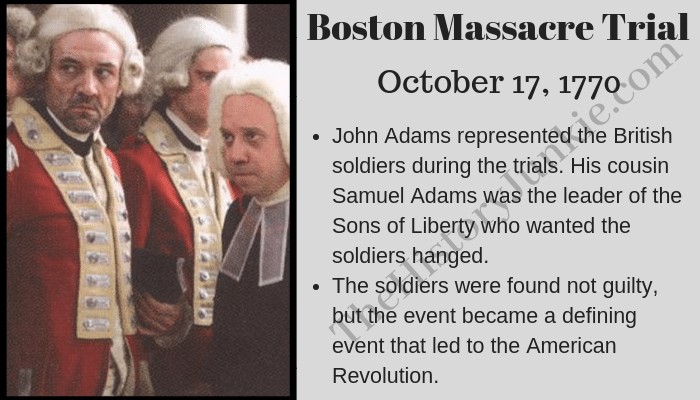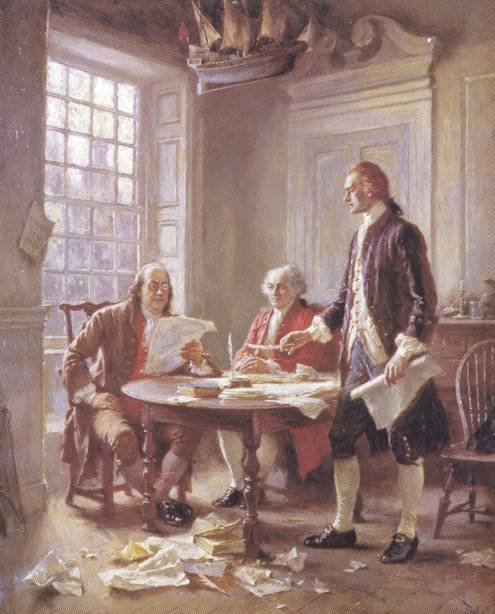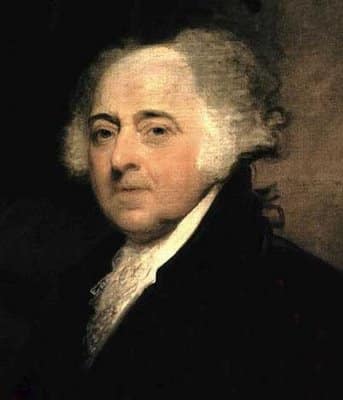Until recent years, John Adams was a forgotten founder. However, thanks to David McCullough's book and the HBO Mini-Series that document his life, there has been a new interest in the short and stocky founder.

He is often crammed in between two legends of American History, George Washington and Thomas Jefferson, which is ironic since it was John Adams who discovered both of these men and catapulted them onto the international stage.
John Adams helped mold America in its formative years, and his accomplishments should not be forgotten.
Jump to:
- John Adams Opposed the Stamp Act
- John Adams Defended the British during the Boston Massacre
- John Adams Nominated George Washington for Commander-in-Chief
- John Adams had Thomas Jefferson write the Declaration of Independence
- John Adams Married Abigail Smith
- Served as Diplomat to Three Countries
- John Adams became the 2nd President of the United States
- John Adams Avoided War with France
- John Adams rekindled his relationship with Thomas Jefferson
John Adams Opposed the Stamp Act
A young John Adams rose to prominence when he opposed the Stamp Act of 1765.
Adams authored the "Braintree Instructions" in 1765 in the form of a letter sent to the representatives of Braintree in the Massachusetts legislature.
In it, he explained that the Act should be opposed since it denied two fundamental rights guaranteed to all Englishmen (and which all free men deserved): rights to be taxed only by consent and to be tried by a jury of one's peers.
The instructions were a succinct and forthright defense of colonial rights and liberties and served as a model for other towns' instructions.
John Adams Defended the British during the Boston Massacre

If one thing would be true about John Adams throughout his life, it is that he was never afraid to take an unpopular position if his conscience dictated it.
Due to colonial resistance to British rule over the colonies, the British sent their soldiers to Boston to try and keep the peace. It caused even more trouble and gave rise to the Sons of Liberty, which ignited a firestorm of resistance within Boston.
This led to the Boston Massacre, which left many colonists injured and some dead, including Crispus Attucks. The soldiers involved in this confrontation were arrested and forced to stand trial.
With colonists wanting justice done to these soldiers, it would be John Adams who would come to the defense of the soldiers. He argued ferociously and logically.
His arguments were based on reason and the rule of law rather than emotion. He went up against Robert Treat Paine and his cousin Samuel Adams.
A jury of Bostonians acquitted the British soldiers, and John Adams would gain recognition from colonial and British leadership.
John Adams Nominated George Washington for Commander-in-Chief
Adams quickly gained notoriety for his passion for independence. He drew attention from Benjamin Franklin, John Dickinson, Thomas Jefferson, and many other delegates in the Continental Congress.
However, he was seen as a New England man and not a spokesperson for the entire 13 colonies.
When it came time to nominate someone as a commander of the Continental Army, most of the delegates believed that John Adams would nominate a fellow New Englander such as John Hancock.
However, John Adams would shock the room when he nominated George Washington. Adams had spoken to Washington and was impressed with his demeanor and leadership. He also learned how to play politics.
Virginia was the largest state and the most influential. He knew that nominating a man from Virginia would be more meaningful and influential than nominating someone from Pennsylvania or Massachusetts.
It proved to be one of the best decisions he made in his life. If it had not been for John Adams, America may have never known George Washington.
John Adams had Thomas Jefferson write the Declaration of Independence

It has been said that John Adams was the voice while Thomas Jefferson was the pen of independence.
The two of these men became best friends during this time, and both had very different personalities.
Adams was fiery and passionate, while Jefferson was quiet and standoffish. Adams had many enemies, while Jefferson had none.
Despite the difference in personality, the two were united in thought. John Adams asked Thomas Jefferson to write the Declaration due to his ability with the pen and because he was from Virginia.
Thomas Jefferson wrote it, while John Adams and Benjamin Franklin were influential in its editing.
John Adams Married Abigail Smith

Abigail Smith was out of John Adam's league. She was much younger and, by all standards of the day, considered beautiful.
Abigail drew recognition from George Washington and Thomas Jefferson as an intelligent and resourceful woman at a time when women did not receive much recognition.
She was an early voice against slavery and the treatment of women.
John and Abigail Adams had a strong relationship and many times, she was the voice of reason to him. They spent much time away from each other during the American Revolution. However, their relationship survived and thrived.
Served as Diplomat to Three Countries
John Adams served as a United States diplomat for 3 different countries.
His first run was in France during the American Revolution. There, he served with Benjamin Franklin and later Thomas Jefferson. He struggled with French culture and the language barrier.
He saw more success in the Dutch Republic. However, he suffered a nervous breakdown and was unable to serve his full capacity.
Adams also served as an ambassador to Great Britain after the war. He found it difficult to negotiate due to America being so young and unable to pay off its debts to the merchants.
John Adams did not see much success in his tenure as a diplomat; however, his son, John Quincy Adams, served much time with him and became the greatest diplomat in American history, most likely due to his father's influence.
John Adams became the 2nd President of the United States

John Adams is crammed in between two giants and is often overlooked. However, despite not being gracious in defeat, Adams successfully transitioned the government from George Washington to himself.
When George Washington stepped down from the Presidency and returned to private life, he shocked the world. However, there was no coup, and the government was transitioned peacefully.
While it was a more tumultuous transition, John Adams did ultimately leave the office of the Presidency peacefully and return to private life when Thomas Jefferson defeated him in the Election of 1800.
This was the first time in America that the power shifted from one political party to the other.
John Adams Avoided War with France
When George Washington gave his farewell speech, he mentioned that America needed to stay out of entangling alliances.
By the time John Adams came to power, there was much political pressure from the Democratic-Republicans to support the French Revolution.
However, if America would support France, then they would be in conflict with England. John Adams opted to stay neutral and began to build up the American Navy.
The navy that would begin with Adams would serve effectively during the War of 1812.
Despite it being an unpopular stance that would cause more tarnish to his reputation from Thomas Jefferson and his supporters, he stayed the course, and history would prove his decisions correct.
John Adams rekindled his relationship with Thomas Jefferson

The early years of Adams and Jefferson launched a tight friendship, and over the years, it became stronger.
However, after the American Revolution, the two would stand on opposite ends of the political spectrum.
Thomas Jefferson supported the French Revolution and became a radical revolutionary. While John Adams always preferred the rule of law over chaos and favored neutrality.
The election of 1800 became nasty, with the two best friends accusing each other of many things, and by the end, the two would not even speak to each other.
Abigail Adams would die never forgiving Thomas Jefferson for his actions. However, in their later years, with the next generation now in power, the two founders rekindled their relationship.
Benjamin Rush re-introduced them to each other, and the two revolutionaries began a series of letters that would become some of the greatest memoirs from the revolutionary generation.
The two were some of the most influential men in crafting the Declaration of Independence, so it is only fitting that the two would die on their 50th anniversary.
